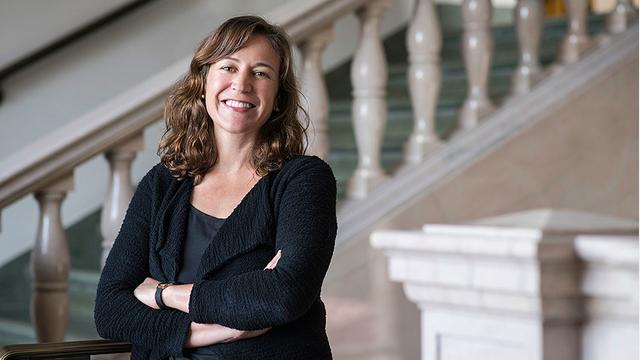Today's college students increasingly demand engaged scholarship—curricula and research opportunities directly relevant to addressing climate change, misinformation, widespread social unrest, and other sustainability, environmental, and social challenges. But they often find the traditional university model ill equipped to deliver that worldly engagement.
Now a new book—The Guidebook for the Engaged University—provides a comprehensive roadmap for administrators, faculty, and students who want to make their institutions of higher education systematically more welcoming to engaged research—and avoid accusations of ivory-tower irrelevance.
Bonnie Keeler, associate professor at the Humphrey School of Public Affairs, led the project as director of Beyond the Academy, an international network of hundreds of researchers working to make universities more supportive of engaged scholarship with real-world impact.
The Guidebook highlights university best practices to foster and support engaged scholarship by aligning their structures, incentives, and outcomes with solving the defining problems of our generation.
"Conventional academic systems reward individual work over collaboration, and conformity over risk taking,” said Keeler. “Those business-as-usual approaches aren't enough to solve these challenges. We hope the Guidebook encourages others to advocate for reforms in their own institutions and serves as a reminder that change is not only possible, but happening at universities all across the globe."
Beyond the Academy began in 2018 as a project funded by the National Academies Keck Futures Initiative (NAKFI Challenge), led by the University of Minnesota and involving more than a dozen universities worldwide.
A First of Its Kind, Three Years in the Making
The Guidebook is the first blueprint of its kind to building “Engaged Universities,” institutions that systematically support engaged scholarship and service.
To write it, members of the Beyond the Academy Network spent the last three years exploring how universities are already reforming their systems and structures in ways that promote action-oriented research and practices that respond to society's needs. Academic leaders from across the United States, Canada, and the United Kingdom shared ideas, research, resources, and examples.
Chapters of the Guidebook cover solutions for some of the major challenges to engaged scholarship at scale, from the way research impact is measured, to promotion and tenure practices, graduate training, and recruitment and retention of engaged scholars.
The Guidebook also showcases dozens of examples from universities around the world of how these solutions have been put into practice.
For instance, the Office of Public Engagement at the University of Minnesota provides grants for academic departments that wish to develop or strengthen community engagement initiatives, offers training to promotion and tenure committee members about standards for high-quality community-engaged scholarship, and supports graduate students in developing projects with neighborhood organizations.
The Next Step: Broader Institutionalization of Engaged Scholarship
But Keeler says the next phase of academic reforms must build on these experiments and best practices toward broader acceptance and implementation of engaged scholarship in academia.
“Universities today risk global irrelevance unless they adopt an ‘Engaged University’ approach as we’ve outlined—one that systematically supports and encourages scholar and staff engagement with society,” she said.
“Shifting to that model will require deep transformation in universities. They must better align their structures, incentives, and outcomes to acknowledge, value, and incentivize scholarly and staff engagement with these issues. But examples of positive steps exist in nearly every institution. We must scale and share these steps as quickly and widely as possible.”
The Guidebook is available for free on the Beyond the Academy website.


